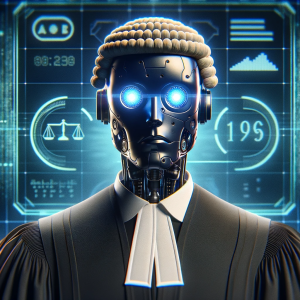
The Morality of Machines
Artificial Intelligence (AI) has become a ubiquitous presence in our daily lives, raising profound moral questions as it interacts more deeply with human society. From virtual assistants to autonomous vehicles, AI is increasingly being tasked with making decisions that have significant ethical implications. This blog will explore the complex interplay between AI and moral psychology, breaking down the key roles AI plays as moral agents, patients, and proxies, and examining how these roles affect our perceptions and interactions with intelligent machines.
Machines as Moral Agents
The Unexpected Ethical Dilemmas
Imagine your car having to decide who to protect in a potential accident scenario: you, the passenger, or a pedestrian. This isn’t a scene from a sci-fi movie; it’s a real ethical dilemma faced by developers of autonomous vehicles. AI systems, particularly those with life-and-death implications like medical diagnosis algorithms or self-driving cars, are considered moral agents because their actions have significant moral consequences.
When we think of machines making ethical decisions, we often assume they must be perfect. However, this isn’t feasible. For instance, self-driving cars are expected to be safer than human drivers before they can be widely adopted, but achieving perfection is impossible. Thus, we must decide how many mistakes we’re willing to tolerate from these machines. This raises the crucial question: Are we holding AI to higher standards than we hold ourselves?
Our Expectations vs. Reality
Research shows that people often expect AI to outperform humans significantly. In a study involving self-driving cars, participants believed their driving skills were superior to AI, leading to unrealistically high safety expectations for the AI. This bias extends to other domains, such as medical AI, where patients doubt the AI’s ability to understand their unique circumstances, despite similar limitations in human doctors.
Moreover, the potential biases in AI decisions are a significant concern. Algorithms can inadvertently perpetuate or even amplify existing biases, such as racial biases in facial recognition or credit scoring systems. Addressing these biases is essential to ensure fairness and trust in AI systems.
Machines as Moral Patients
Empathy Towards Machines
Consider the scenario where a robot is mistreated. Even though we know robots don’t feel pain, many of us experience discomfort watching such abuse. This phenomenon highlights our tendency to project human traits onto machines, affecting our interactions and cooperation with them.
Studies show that while people do cooperate with machines, they don’t do so as readily as with other humans. This “machine penalty” is evident in various experiments where participants were less likely to trust or share resources with AI compared to humans. Overcoming this penalty is crucial for fostering effective human-AI collaboration.
Building Trust and Cooperation
One approach to bridge the gap in cooperation is humanizing AI. Making robots more human-like can sometimes enhance trust, but it often falls into the “uncanny valley”—a point where robots are almost human but still noticeably artificial, causing discomfort. Interestingly, gendering machines as female has been found to reduce this penalty, though this raises ethical concerns about reinforcing gender stereotypes.
Another approach is transparency. Clear, understandable explanations of AI decisions can help build trust. For example, if a medical AI explains its diagnostic process, patients might feel more comfortable relying on it.
Machines as Moral Proxies
Delegating Ethical Decisions
AI isn’t just making its own decisions; it’s also being used to carry out human decisions, sometimes in morally ambiguous ways. For instance, AI can be used for personalized marketing, which might involve manipulative tactics. This raises questions about accountability and the ethical use of AI.
Moreover, AI’s ability to act on behalf of humans can lead to moral distancing. People might delegate unethical tasks to AI to avoid direct responsibility, such as using algorithms for price gouging or biased hiring practices. Ensuring ethical AI usage requires clear guidelines and accountability mechanisms.
AI-Mediated Communication
AI also mediates human communication, altering how we present ourselves online. From generating social media posts to modifying our voices and appearances in video calls, AI can significantly influence social interactions. While this can have positive effects, like reducing discrimination, it also raises ethical issues around authenticity and trust.
Conclusion
As AI continues to evolve and integrate into our daily lives, understanding its role in moral psychology is crucial. Whether as moral agents, patients, or proxies, intelligent machines challenge our traditional ethical frameworks. By addressing biases, improving transparency, and fostering trust, we can navigate the ethical terrain of AI and ensure it serves humanity’s best interests.
Discussion Questions
- How do you feel about AI making decisions in critical areas like healthcare or law enforcement? What safeguards do you think should be in place?
- Do you trust AI more or less than human decision-makers in everyday scenarios? Why?
Transform Your Science World
Get the latest and most inspiring scientific updates with ‘This Week in Science’! Perfect for educators and science enthusiasts, our free weekly newsletter delivers groundbreaking research and stories that ignite your passion for learning and teaching. Sign up today and transform your approach to science.



